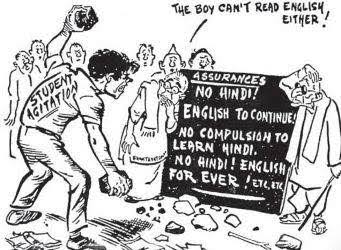The British artist and author Edmund De Waal said “With languages you are at home anywhere”. But this sort of philosophic insight is ill-advised in a polarized nation such as ours. Union Home Minister Amit Shah’s comment on language seems to have stirred a hornet’s nest “Diversity of languages & dialects is strength of our nation. But there is need for our nation to have one language, so that foreign languages don’t find a place.” While there is nothing objectionable in his comment as such, the divide and indeed distrust between the North and the South coupled with the deep-seated regional sentiments make the views seem like an effort by a dictator to impose a foreign language on a subjugated underclass.
The anti-hindi imposition movement dates back to the pre-independence era when the first agitation was launched in 1937 in opposition to the introduction of compulsory teaching of Hindi in the schools of Madras Presidency. Subsequently all efforts by the Central government to make hindi the sole official language after 1965 were opposed by many non-hindi speaking states.
There are many aspects to this affair. First of course is the status of hindi as a medium of communication which has increased enormously due to the electronic media. Most of the non-hindi speaking states are in the south and the Northeast. In the Northeast the conversation between the citizens of the different states is largely conducted in hindi. While this is a matter of convenience as there are a significant number of north Indian settlers and migrants there, a similar situation is developing in the southern states where migrants/unskilled laborers from the northern belt have settled and have in due course forced the natives to willy nilly converse in hindi. This is of course a voluntary act and facilitates the ease of doing business. But when a circular is issued the entire state is up in arms against the directive ostensibly because it has come from a government which is trying to impose a foreign culture.
If hindi becomes the language of official communication the process of negotiating the considerable red tape of Indian officialdom becomes an even more cumbersome process for the largely illiterate masses unfamiliar with Hindi.
The opposition in Tamil Nadu is essentially because imposition of Hindi is seen as a process of cultural imperialism which will in due course pervade every aspect of the life of the local populace. The nature of language is essentially transactional; as long as it is to their advantage and if they are necessarily gaining from it no state or indeed any citizen will oppose the introduction of hindi into their lives. It is the essential cosmopolitan nature of a state that brings in a multilingual culture and the necessary presence of a link language.
As the cosmopolitanization of the south and other regions happens (the process is already underway) there will be a greater willingness of the locals to embrace a lingua franca and there is no reason to believe that hindi will not be the obvious choice. Maharashtra is the prime example of this where despite the presence of people from possibly every part of the country in Mumbai and indeed other cities like Pune and Nasik the local culture has flourished and led the settlers from other states to adopt it as their own.
Probably the best way to deal with this in the current scenario is not to seek to oblige the dissenters to embrace the language but to trust the process wherein the people see the advantage of learning the language as it will facilitate their development and well-being. The reasons are not far to seek, as the main protagonist of this controversy is himself not from a hindi-speaking state. One would assume that having seen the gradual progress of his state over the last couple of decades he has seen the profits of having a language that connects people. Apart from enabling the ease of doing business it also brings people together and popularizes the local culture.
However for such an outcome the easy and gradual movement of people across state borders has to be encouraged. Individual pronouncements might take time to assume an official position and might even become letter of the law but a lot of damage could be done in the interim. A violent movement against hindi and inconsequence hindi-speaking migrants might derail the process altogether. The first salvo fired by the old faithful Yeddyurappa – “No compromise on importance of Kannada culture” indicates the opposition that the party might face from its own ranks if it decides to pursue this agenda to its logical end. It would be probably prudent to micromanage the process and not push the people.
Article By: Shantanu Sharma




Leave a reply